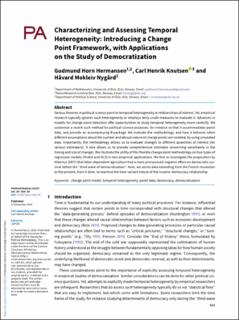| dc.contributor.author | Hermansen, Gudmund Horn | |
| dc.contributor.author | Knutsen, Carl Henrik | |
| dc.contributor.author | Nygård, Håvard Mokleiv | |
| dc.date.accessioned | 2022-06-13T12:01:41Z | |
| dc.date.available | 2022-06-13T12:01:41Z | |
| dc.date.created | 2021-01-30T19:34:52Z | |
| dc.date.issued | 2020 | |
| dc.identifier.citation | Political Analysis, 2021, 29(4), 485-504 | en_US |
| dc.identifier.issn | 1047-1987 | |
| dc.identifier.uri | https://hdl.handle.net/11250/2998524 | |
| dc.description.abstract | Various theories in political science point to temporal heterogeneity in relationships of interest. Yet, empirical research typically ignores such heterogeneity or employs fairly crude measures to evaluate it. Advances in models for change point detection offer opportunities to study temporal heterogeneity more carefully. We customize a recent such method for political science purposes, for instance so that it accommodates panel data, and provide an accompanying R-package. We evaluate the methodology, and how it behaves when different assumptions about the number and abrupt nature of change points are violated, by using simulated data. Importantly, the methodology allows us to evaluate changes to different quantities of interest (for various estimators). It also allows us to provide comprehensive estimates concerning uncertainty in the timing and size of changes. We illustrate the utility of this flexible change point methodology on two types of regression models (Probit and OLS) in two empirical applications. We first re-investigate the proposition by Albertus (2017) that labor-dependent agriculture had a more pronounced negative effect on democratic survival before the “third wave of democratization.” Next, we utilize data extending from the French revolution to the present, from V-Dem, to examine the time-variant nature of the income–democracy relationship. | en_US |
| dc.language.iso | eng | en_US |
| dc.publisher | Cambridge University Press | en_US |
| dc.rights | Attribution-NonCommercial-NoDerivatives 4.0 Internasjonal | * |
| dc.rights.uri | http://creativecommons.org/licenses/by-nc-nd/4.0/deed.no | * |
| dc.subject | Change point model | en_US |
| dc.subject | Temporal heterogeneity | en_US |
| dc.subject | Panel data | en_US |
| dc.subject | Democracy | en_US |
| dc.subject | Democratization | en_US |
| dc.title | Characterizing and Assessing Temporal Heterogeneity: Introducing a Change Point Framework, with Applications on the Study of Democratization | en_US |
| dc.type | Journal article | en_US |
| dc.type | Peer reviewed | en_US |
| dc.description.version | publishedVersion | en_US |
| dc.rights.holder | The Authors | en_US |
| dc.source.pagenumber | 485-504 | en_US |
| dc.source.volume | 29 | en_US |
| dc.source.journal | Political Analysis | en_US |
| dc.source.issue | 4 | en_US |
| dc.identifier.doi | 10.1017/pan.2020.39 | |
| dc.identifier.cristin | 1883422 | |
| dc.relation.project | Norges forskningsråd: 275400 | en_US |
| dc.relation.project | Norges forskningsråd: 240505 | en_US |
| cristin.ispublished | true | |
| cristin.fulltext | postprint | |
| cristin.qualitycode | 2 | |

